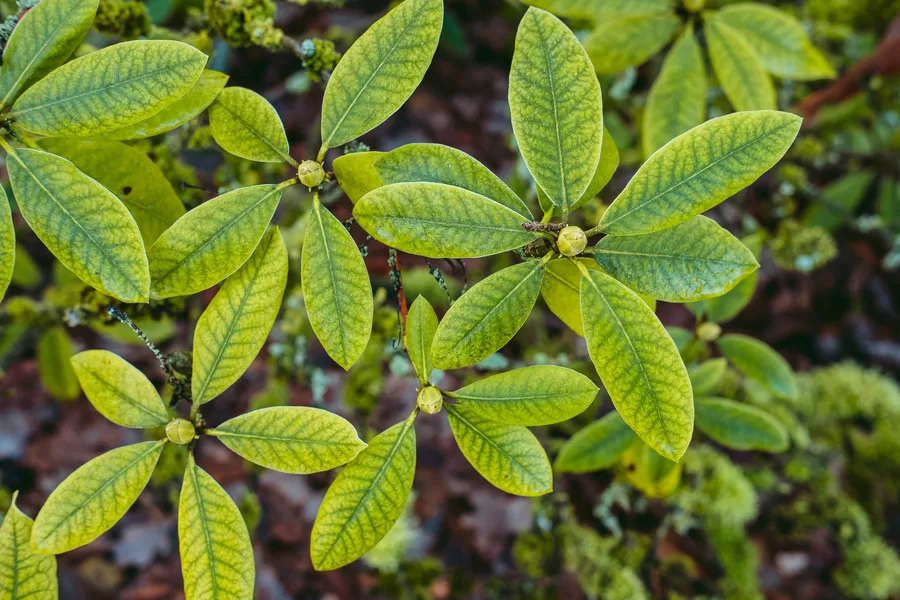
Damiana leaf is a fascinating herb native to the lush landscapes of Central and South America – not just any plant, but a legacy left by the Mayans and Aztecs. Its aromatic foliage and unique properties have transcended time, offering more than just an insight into historical herbal healing methods.
Exploring Damiana Leaf
Origin and Nature of Damiana Leaf
The Damiana Leaf, known in scientific circles as Turnera diffusa, is a diminutive shrub noted for its fragrant foliage. It naturally thrives in the balmy and moist environments of Central and South America, extending to some regions like Texas, Mexico, and the Caribbean. Its growth is optimal in these warm climates.
In the annals of history, the Damiana Leaf has been a significant herb for various indigenous cultures, including the renowned Mayans and Aztecs. They esteemed it not only as an aphrodisiac but also as a general health tonic. Its diverse applications ranged from treating respiratory conditions to addressing psychological ailments and even easing menstrual discomfort.
Damiana Leaf in Contemporary Times
Fast forward to the present day, Damiana Leaf is accessible in several formats, each catering to different preferences and uses:
Tea
Damiana Leaf tea, a brew made from the plant’s dried leaves, is celebrated for its soothing effects and unique, mildly spicy taste. This traditional preparation method is a favorite for those seeking a natural relaxant.
Supplements
Capsules and tablets offer a more potent form of Damiana, primarily utilized for their proposed benefits in enhancing libido and sexual health.
Tinctures
The liquid extract, or tincture, of Damiana Leaf, often combined with alcohol, is popular for its fast absorption and ease of use, allowing precise dosage control.
Smoking
Although less common, some individuals opt to smoke Damiana Leaves for their mild, tranquilizing effects.
Regardless of the form it takes, Damiana Leaf remains a sought-after herbal remedy. It’s always advisable, however, to consult a healthcare professional before introducing any new supplement into your routine.
Exploring the Herbal Influence on Hormonal Balance
Natural Solutions in Hormone Regulation
The herbal world offers intriguing possibilities for managing key bodily functions, with particular interest in plants like Turnera diffusa. This herb is noted for its potential interaction with hormonal systems, especially concerning the regulation of testosterone, a vital hormone in both men and women.
Key constituents of this herb, specifically flavonoids such as pinocembrin, are thought to be instrumental in modulating hormonal levels. These natural elements could play a crucial role in maintaining or enhancing testosterone, thereby impacting various health aspects, including sexual wellness and energy.
Broader Health Perspectives from Herbal Usage
While eschewing specific research citations, the legacy of this particular herb is rooted in centuries of traditional use and modern-day anecdotal evidence.
Whether used in a soothing tea or as a dietary supplement, this herb is believed to contribute positively to hormonal harmony. Regular consumption could potentially assist in the optimization of testosterone levels, often associated with heightened libido, mood enhancement, and better energy management.
The ongoing discourse in herbal circles combines historical insights with current health trends, reflecting a deep interest in the herb’s role in hormonal health. As the scientific community continues to explore these areas, the herb remains a topic of fascination for its possible health benefits.
To summarize, the connection between this herb and testosterone levels is an area ripe with traditional knowledge and personal experiences. Individuals interested in exploring herbal supplements for health purposes are advised to seek guidance from healthcare professionals to align with their specific health goals.
Strategies for Effective Herbal Supplementation
Customizing Herbal Dosage for Individual Needs
- Crafting Herbal Brews: Preparing a tea from dried herbal leaves is a traditional approach. Steep one to two teaspoons in boiling water for 5 to 10 minutes. This herbal tea can be consumed once or twice daily, depending on individual tolerance and health objectives.
- Pill and Capsule Forms: For those preferring supplements, the standard intake is usually 400 to 800 mg, once or twice daily. Be sure to consult the specific guidelines of the supplement or seek advice from a health professional.
- Liquid Herbal Extracts: Tinctures are another popular form, with a typical dose being 2-4 ml up to three times daily. This can be taken directly or mixed into a beverage.
Starting with a smaller amount and observing your body’s response is key. Adjust the dosage as necessary, being mindful not to exceed recommended amounts.
Integrating Herbs with Holistic Health Approaches
Enhancing the benefits of herbal supplements extends beyond mere consumption. Incorporating them into a broader health strategy can yield more significant results:
- Mixing with Other Natural Supplements: Pairing the herb with other supplements that share similar health benefits can amplify its effectiveness. Always ensure to get professional advice for safe combinations.
- Adopting a Comprehensive Lifestyle Approach: Aligning herbal intake with positive lifestyle changes like engaging in regular exercise, eating a balanced diet, and ensuring proper sleep can enhance the overall impact of the herbal supplement, fostering better health and energy.
Essential Safety Tips for Herbal Supplement Usage
Recognizing Common Side Effects
When incorporating herbal supplements, such as Turnera diffusa, into your health routine, it’s important to be aware of potential side effects to ensure safe consumption. These natural remedies are typically safe when taken in moderation, but overuse or improper use can lead to adverse effects.
Possible side effects you might encounter include:
- Gastrointestinal Reactions: Initial use of these supplements might result in digestive discomfort, including symptoms like upset stomach, constipation, or diarrhea.
- Blood Sugar Fluctuations: Particularly for those managing diabetes, these herbs can impact blood sugar levels. Regular monitoring in such cases is crucial.
- Medication Interactions: There’s a risk of interaction with certain medications, particularly those related to blood thinning and diabetes management, potentially altering their effectiveness.
Furthermore, it’s advisable to avoid these supplements in specific conditions:
- During Pregnancy or Breastfeeding: Given the lack of comprehensive data on safety during pregnancy and lactation, erring on the side of caution and avoiding these herbs is recommended.
- If You Have Certain Health Conditions: Individuals with specific health issues, like liver disorders or hormone-sensitive conditions, should consult with a healthcare professional prior to use.
Times to Exercise Added Caution
Additionally, certain circumstances call for increased vigilance or outright avoidance of these supplements:
- Prior to Surgery: It’s wise to discontinue use at least two weeks before any planned surgery due to possible effects on blood sugar levels and bleeding risk.
- When Taking Prescribed Medications: Consultation with a healthcare provider is essential if you’re on medications processed by the liver or diuretics, as the herb may interact with these drugs.
- In the Event of Allergic Reactions: Should you experience signs of an allergy, such as skin irritation or breathing difficulties, immediately cease use and seek medical attention.
In summary, while herbal supplements offer numerous health benefits, their safe usage is paramount. Being informed about potential side effects, contraindications, and situations requiring extra care can help ensure a positive and safe experience. Consulting with healthcare professionals before starting any new herbal supplement is highly recommended, especially for those with existing health conditions or on medication.
Nutritional Enhancements with Herbal Additions
Integrating herbs into your daily meals and drinks can enrich your dietary experience, offering unique flavors and potential health benefits.
Herbal Morning Beverage
Start your day with a calming herbal brew. Steep a teaspoon of dried herbs in boiling water for about 10-15 minutes. Enjoy this infusion in the morning or evening to unwind. Enhance its flavor and benefits by adding honey and lemon to taste.
Revitalizing Herbal Tonic
Combine your herbal tea with natural sweeteners and spices for an energizing tonic. A dash of honey, some fresh lemon juice, and a hint of ginger can elevate the herbal infusion, making it a refreshing drink with digestive benefits.
Green Smoothie Twist
Boost your smoothies with a teaspoon of powdered herbs. Blending it with fruits such as bananas or berries introduces a subtle herbal note and enriches your smoothie with an extra layer of flavor and nutrition.
Infused Chocolate Delight
Create an exquisite treat by mixing finely ground herbs into melted dark chocolate. Pour the blend into molds and let it cool. This combines the indulgence of chocolate with the herbal benefits, offering a unique and healthful snack.
Herbal Salad Splash
Whisk together an herbal-infused olive oil, vinegar, mustard, and honey to dress your salads. Infuse olive oil with herbs by warming it gently and then allowing the dried herbs to steep before straining. This dressing brings a fresh and aromatic dimension to your greens.
Cautions for Culinary Use
When experimenting with herbs in your diet, it’s wise to introduce them gradually. Although generally safe, it’s recommended to consult with a healthcare provider to ensure compatibility with your health profile, particularly for those under medication or with specific health conditions.
Discovering the culinary possibilities of herbs not only diversifies your palate but also potentially contributes to your health and wellness journey. From a soothing tea to an innovative salad dressing, these herbal enhancements can provide both flavor and nourishment.
Conclusion
Originating from verdant landscapes of the Americas, Damiana stands out for its enriching impact on personal health. Acknowledged by ancestral cultures for its energizing and healing capabilities, offering more than just a herbal remedy. Diverse availability, from soothing beverages and concentrated tinctures to capsules and inhalable forms, meets varied preferences. Noted for its significant influence on maintaining hormonal equilibrium, particularly enhancing sexual wellness and mood. Emphasizes the importance of seeking professional healthcare advice before incorporating Damiana into wellness practices.
FAQs
Damiana represents a botanical treasure from the Americas, lauded for centuries due to its vitality-boosting and restorative qualities.
This versatile herb is available in various formats, including aromatic teas, concentrated liquid extracts, ingestible capsules, and even as leaves for smoking, accommodating diverse lifestyle and wellness preferences.
Notably, it aids in achieving hormonal balance, amplifies sexual health, and fosters mood enhancement, contributing to overall well-being.
Individuals with specific health conditions, pregnant or nursing women, and anyone under medication should seek advice from healthcare practitioners prior to integrating Damiana into their health practices.







